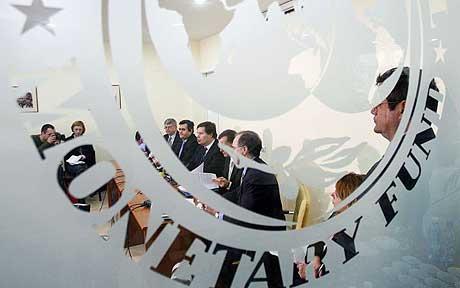 Venezuelan President Hugo Chavez received an economic lifeline from the International Monetary Fund, a global financial institution that he usually demonizes as a capitalist weapon at the service of the United States.
Venezuelan President Hugo Chavez received an economic lifeline from the International Monetary Fund, a global financial institution that he usually demonizes as a capitalist weapon at the service of the United States.
Venezuela’s central bank just saw its international dollar reserves jump to their highest level in almost nine months as the IMF last week deposited $3.5 billion in special drawing rights, or SDRs, which essentially amount to the organization’s own currency.
The SDRs, which can be converted into cash, are being held in the central bank’s international reserves, said Jose Guerra, a former head of economic research at the central bank.
A spokesman for the central bank declined to say whether the $3.7 billion increase in the central bank’s international reserves last week was partly due to the SDRs. The central bank’s international reserves now stand at $34.5 billion.
The SDRs can be converted into cash by selling them to another central bank.
The higher international reserves come as the Chavez administration faces a cash crunch this year and has struggled to build up its dollar reserves.
Chavez withdrew $12 billion from the international reserves in January to finance the Fonden development fund, an off-budget spending vehicle that is not subject to legislative oversight. Since then the central bank’s international reserves have hovered around $30 billion, and have occasionally dipped below that level.
The IMF payment to Venezuela is part of a larger effort by the multilateral agency to boost global reserves.
The payment, however, could end up fueling Chavez’s socialist-inspired economic policies. Under laws approved at Chavez’s behest, the executive branch can withdraw central bank reserves above an artificial optimum reserve level, which is currently set at $30 billion.
The money is then funneled into the Fonden development fund, which also receives cash infusions from state oil company Petroleos de Venezuela.
The higher reserves will be welcomed by the Fonden, which is likely to receive the excess reserves above $30 billion early next year, Guerra said.
Chavez praised the increase in the central bank reserves without mentioning the IMF or his rocky relationship with the organization.
After canceling Venezuela’s debt with the IMF, Chavez threatened in 2007 to withdraw from the IMF, characterizing it as a “capitalist” and “imperialist” instrument of U.S. foreign policy.
The president was forced to back off his plan as exiting the IMF could have placed the country in a state of technical default with its foreign debt.
Source: Wall Street Journal











More of a question. Does the IMF require that the borrower takes prior disbursement of funds takes economic measures to guarantee repayment of loan. How does it works.
[…] VENEZUELA Venezuela’s Central Bank Reserves Boosted By IMF Infusion […]
[…] Venezuela’s Central Bank Reserves Boosted By IMF Infusion […]
[…] pero el país sigue más y más en en deudas, emisiones de bonos, obtención de préstamos incluso del FMI, esa despreciable herramienta del capitalismo, e imprimiendo dinero como si no hubiera un […]
[…] febril, pero el país sigue más y más en en deudas, emisiones de bonos, obtención de préstamos incluso del FMI, esa despreciable herramienta del capitalismo, e imprimiendo dinero como si no hubiera un mañana, […]